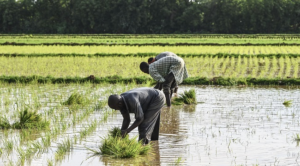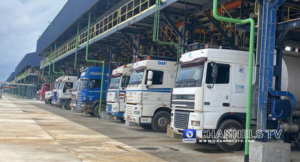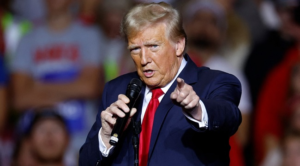Former Vice President and chieftain of the All Progressives Congress (APC), Alhaji Atiku Abubakar, has identified the basic factors which he said are necessary for building a Nigeria that works.
Alhaji Atiku, who was the nation’s Vice President between 1999 and 2007, specifically identified restructuring of the nation’s federal system, diversification of the economy from oil, reform of the nation’s politics and the reformation of the various anti-corruption agencies among others as essential for the country to work.
The former Vice President to erstwhile President Olusegun Obasanjo said this while accepting the Hero of Nigeria Democracy Award conferred on him by Hall of Grace Magazine at The Civic Centre, Ozumba Mbadiwe Street, Victoria Island, Lagos.
In the words of Alhaji Atiku, to build a Nigeria that works, “We need to restructure our federal system to devolve more powers and resources to the federating units.
“It will encourage states to compete to attract investment and skilled workers rather than merely waiting for monthly revenue allocations from Abuja.
“This will also include the establishment of state police for the states that so desire so as to improve security.
“We must be open to changing the nature of the federating units such as using the existing geo-political zones as federating units rather than the current 36, of which only a few are financially viable.
“Political decentralization must be accompanied by economic diversification.
“We need to diversify our economy away from the dependence on oil. We need to create opportunities for our people to engage in diverse economic activities which governments will then tax for revenues. But we can’t do that efficiently and effectively without accurate data. I have in the past called for an end to the self-defeating politics we play with census in the country.
“With all the data gathering and analytic tools in existence in the 21st century, we have no good reason not to have accurate data on our people, down to the smallest unit, the individual.
“Without data, we cannot plan properly and all of us will lose, including those who try to inflate their population figures and those who want to suppress those of others.
“Political decentralisation will also help to deepen and strengthen our democracy as it will encourage more accountability. Citizens are more likely to demand accountability when governments spend their tax money rather than rent collected from an impersonal source.
“To further strengthen our democracy we need to reform our politics, especially by reforming our electoral system.
“Such reform must ensure that those who emerge as winners after an election are really those freely chosen by the people.
“The electoral reform should largely be along the lines recommended by the Justice Mohammad Uwais panel on electoral reforms. For example, funding the electoral umpire from the first line charge in the Consolidated Revenue Fund is critical; transferring the power to appoint the chairman of the electoral umpire from the President to the National Judicial Council will help, as will efforts to curb the role of money and godfathers in our elections.
“We also need to reform the anti-corruption agencies to help depoliticize them and make them really independent.
“This will help to strengthen the fight against corruption, which is critical in renewing our people’s belief in the integrity of public institutions and public officials.
“Such a reform will require changes to how the agencies are funded, how their heads are appointed and who they report to.
“While not exhaustive, these steps, if taken, will help us to produce effective and public-spirited leadership and certainly help us to live up to our economic potentials and evolve into a nation where citizens and every segment of the population feel proud, welcome and committed to its long-term health and survival”, he said.
Atiku, who is the Turakin Adamawa, made it pointedly clear that the reality is that Nigeria does not work well whether we focus on security, education, economic production, employment generation and people’s welfare or we focus on governance and politics or the relationships among our diverse ethnic, regional, and religious groupings.
He noted that the government relies excessively on rent derived from a single export product, crude oil, for revenues.
The former Vice President stressed that the consequences of that included over-exposure to the vagaries of the world oil market over which we have little control.
He added that the over-concentration on oil has also led us to over-centralise power and concentration of economic resources at the federal level at the expense of the federating states.
Speaking on what went wrong with Nigeria, Atiku pointed out that at independence “we had many challenges, but we began to make steady progress. We had a federal structure with three powerful regions, which retained 50% of the revenues derived from their regions.
“With this they provided security, infrastructure such as roads, power, and portable water, built healthcare facilities, schools and universities, and provided other social services.
“But when the political leaders tried to extend their influence beyond their regions of dominance, it precipitated a crisis that led to the military seizure of power as well as a counter-coup, and ultimately a civil war.
“The military remained in power for all but four years in the period 1966-1999. Among the measures taken by the military leaders was the fragmentation of the regions into states which now number 36; the centralization of power and concentration of resources at the federal level at the expense of the federating states; and the expansion of infrastructure provisioning.
“Others include the expansion of the government’s reach into various aspects of our national life, including the economy (not just as a regulator but as an investor in all sectors of the economy), and involvement in religion by subsidising of religious pilgrimages.
“There were also the federal take-over of institutions and services hitherto belonging to the federating states such as schools and universities, hospitals, roads and power plants; and an activist foreign policy that saw the government intervening diplomatically and financially in the causes of African liberation and Black emancipation, especially in Africa and the Caribbean.
“These measures were encouraged by a sudden rise in oil revenues in the early 1970s.
“The sudden oil wealth had other consequences, including relative neglect of agriculture. It created a mentality, which survives to this day, that oil wealth is here to stay and that we really need not engage in diverse economic activities, which governments typically tax for revenues. Thus we got used to the notion of wealth without work and government revenues that do not come directly from taxation.
“Thus it has been rather difficult for citizens to hold governments to account. Currently, also we have a situation where most of the states in the country are unable to pay their workers or provide basic services unless they collect monthly revenue allocations from the centre.
“However, the decline in oil prices and revenues in the early 1980s, and periodically ever since, has exposed the folly of our ways.
” It has led to serious economic and political crisis including the high level of unemployment and such associated social problems as crimes, including robbery and terrorism, militancy, the decline in the quality of education, healthcare, and other social services, poor infrastructure provisioning.
“We also have agitations by different segments of the country against what they perceive as marginalisation by the governments and the other segments. Excessive centralisation has also led us to place a very high premium on political power, especially at the federal level, leading to instability in our politics, which in turn, scares away investors”, he argued.






